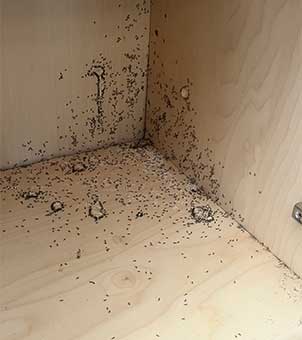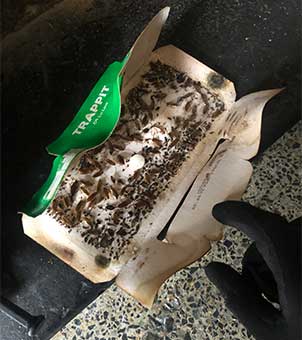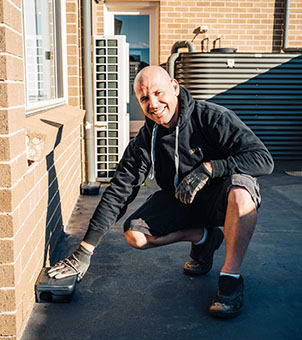What is a wasp?
Some people in Rose Bay are afraid of wasps. They should be!
These pests can grow up to two inches in length and are usually black and yellow. It has six legs, two antennae, and a hard exoskeleton. Its body is divided into three parts: the head, the thorax, and the abdomen. The head contains the eyes and mouthparts. The thorax is fused to the head and contains the wings and legs. The abdomen is where the stinger is located. Wasps are dangerous because they can sting you with their stinger to inject venom. If you are allergic to wasps, their sting can kill you. If you see a wasp in your house try to kill it with a spray or fly swatter. Do not try to touch it with your bare hands because it will sting you. If you are stung by a wasp, seek medical attention immediately.
Wasps are social insects, living in colonies that can number in the thousands. They build nests out of chewed-up wood, which gives them a paper-like appearance.
Wasps are predators, feeding on other insects, spiders, and even small vertebrates like lizards and frogs. In the spring and summer months, you're more likely to see wasps out and about as they forage for food to bring back to their nests.
If you have a wasp problem on your property, it's best to call a professional exterminator to have it removed. If you see a wasp, it's best to keep your distance.
Common Wasp species and their behaviours
Paper Wasps
paper wasps are a type of wasp that is common in Rose Bay. They are about 2.5 cm in length and have a yellow and black striped abdomen. Paper wasps build their nests out of paper, which they make from chewing wood. The nests are usually found in sheltered areas such as under eaves or in trees.
Paper wasps are considered to be beneficial insects because they prey on caterpillars and other pests.
However, they can become aggressive if their nest is disturbed. If you see a paper wasp nest, it is best to leave it alone and contact a pest control professional.
European Wasp
The European wasp (Vespula germanica) is a species of wasp that is native to Europe, Asia, and North Africa. It was introduced to Australia in 1959 and is now found in most parts of the country. The European wasp is a very feared insect in Rose Bay. It is not to be confused with the common paper wasp or yellow jacket. European wasps is much larger, and its sting is considered more painful.
This wasp is a major concern in Rose Bay because it nests in the ground, which can damage grass and other plants.
In addition, the European wasp poses a serious threat to native wildlife, as it competes for food and prey on smaller insects.
They are also a threat to human health because their stings can cause anaphylactic shock in people who are allergic to them. If you see a European wasp in Rose Bay, it is important to contact the authorities immediately.
Yellow Jacket wasp
The yellow jacket wasp gets its name from its black and yellow stripes, which make it look like a bee. These wasps are known for their aggressive behaviour, and they will often sting humans or animals if they feel threatened.
Bright yellow jackets are also capable of delivering multiple stings in quick succession, which can be very painful and even dangerous for humans.
In addition to their aggressive behaviour, yellow jacket wasps are also known for their nest-building abilities. They will often build their nests in hidden places, such as in hollow trees or in the eaves of houses. This can make them difficult to remove, and it is important to call a professional if you suspect that there is a yellow jacket nest on your property.

Types of nests
Clay
Clay wasp nests are most commonly found in Rose Bay. Stinging wasps will make a clay nest by gathering clay from the ground and mixing it with saliva. The clay is then formed into a small ball and left to dry in the sun. Once dry, the ball is taken back to the nest and attached to a surface using the wasp's saliva.
Clay wasp nests are small and typically contain only a few cells. However, they can be up to 10 cm in diameter and may contain thousands of cells. Clay wasp nests are typically found on walls, in trees, or under eaves.
Once the small nest is complete, the queen lays eggs inside it. The eggs will hatch into larvae, which will then pupate into adults. Adult wasps will emerge from new nests in early spring and summer.
If you find a clay wasp nest around your home, it is best to leave it alone and contact us to remove it ASAP!
Paper
Paper wasps are a type of social wasp that build their hanging nests out of, you guessed it, paper. Paper wasps get their name from the material they use to construct their nests.
These nests are often found in sheltered areas around the home, like in eaves or under porches. The nests are made by the females, who chew wood to make a pulp. This pulp is then mixed with saliva and then used to construct the hexagonal cells of their nests. While paper wasps will sometimes reuse old nests, they will also build new ones each year.
Paper wasp nests can be large and elaborately built, with a complex network of cells. However, they can also be small and more simplistic in design. Paper wasp nests are usually brown, but may also be yellow or red. The size and shape of the nest will depend on the specific species of wasp.
The process of making paper is fascinating to watch, but it's also important in another way: it helps to protect the wasps' young. The papery material is strong enough to keep predators out but also allows the wasps to regulate the temperature inside the nest, keeping their young safe and warm.
In-ground
In Rose Bay, in-ground wasp nests are made by excavating a hole in the ground and then constructing a series of cells in which the wasps lay their eggs.
The European Wasp nests underground are typically built in areas where there is plenty of food for the larvae, such as in an open field or near a source of water. Adults will often return to the same nest year after year, adding new cells as needed. In some cases, nests can become quite large, containing thousands of cells and housing hundreds of wasps.
While ground nests can be found in many different locations, they are most commonly found around homes, gardens, and parks. Given their potential size and the fact that they are often located near areas where people congregate, in-ground wasp nests can pose a serious threat to public safety.
If you suspect that there is a nest on your property, it is important to call a pest control professional as soon as possible.



How to Avoid a Wasp Sting
Avoid their nests and don't swat at them if they're near you.
When outdoors in Rose Bay, one should exercise extra caution when dealing with wasps in the area. It is an instinct to swat away wasps if they come near us, but this can lead to a dangerous situation if we disturb their nest.
Not only does swarming provoke them into attack mode, but we also run the risk of inadvertently triggering a cycle of aggressive behaviours in which other wasps in their colony will join in. This can easily escalate and become an unbearable situation in no time.
For safety reasons, it is best to be alert and aware of any wasp nests in the vicinity of Rose Bay before engaging in outdoor spaces. Rather than swarming at them or provoking them in any way, it is better to maintain a distance and avoid further disturbance as much as possible.
Keep food and drinks covered when outdoors
Being in outdoors in Rose Bay can be a great way to enjoy the warm summer weather unless you're in the presence of an unwelcome guest - wasps! These aggressive flying stinging insects are often attracted by sweet foods and drinks, so keeping your eats and beverages covered is one way to ensure you don't have a run-in with one.
Not only does covering your food prevent wasps from stinging you, but it can also act as a deterrent - if they can’t smell anything sweet, then there's less chance they'll come anywhere near you! In addition, wasps tend to stay in the same area if they find something they like.
So if you keep your food hidden away, it significantly reduces their ability (and motivation) to bother you.
Taking these simple precautions can help to keep both yourself and nearby wasps safe in Rose Bay. Remember: cover up human food and drinks when outdoors to avoid any encounters with dreaded wasp stingers!
Regularly check your home for cracks or holes where wasps could enter
To help keep yourself safe from a wasp sting this season, one simple thing you can do is regularly check your home for cracks or holes in walls where they might be able to enter. Common culprits are gaps around chimneys and window frames, so pay particular attention to these areas.
Wasps often like dark, enclosed places in or around homes such as wall cavities and are attracted to sugary foods and other pet food – it's important to bear these in mind when searching for potential access points.
If you see a wasp nest, call a professional for the Wasp removal
It is in everyone's best interest to avoid a wasp sting in Rose Bay, Australia. Being stung by a wasp can cause an uncomfortable swelling at the site of the sting. In some cases, allergic reactions may even develop in people who are particularly sensitive to the venom in wasps’ stings.
It is important to be proactive in avoiding these potentially dangerous situations and that is why E1 Pest Solutions pest professionals in Rose Bay should be called as soon as a wasp intrusion is noticed in one’s home or business space. Calling an E1 Pest Solutions professional ensures that someone with expertise in handling such a situation can be brought in to remove the nests safely and swiftly, get rid of wasps, and reduce any chances of being stung or triggering an allergic reaction.
Pest professionals also have access to the most advanced chemicals and methods for controlling wasps in the area, making them an essential asset in any pest control effort.
What an E1 Pest Solutions Technician does
When in Rose Bay and dealing with a wasp infestation, it is important to call in a professional pest technician. After a thorough assessment of the area, the pest tech will decide on the best approach for removing the wasps.
Dusting, residual spraying and traps are all reasonable methods depending on the severity of the infestation. Before any action is taken by the technician, they are trained in careful risk assessment to ensure that the surrounding environment and property do not become damaged in any way during removal.
As such, when it comes to having wasps removed from one's home or property, it is worth being fearful but also trusting in an experienced pest technician's operating procedures to guarantee the successful killing of many wasps, removal of large nest and protection of one's space against future invasions.
Therefore by consulting with a professional pest control service in Rose Bay, one can be sure that we will eliminate wasps effectively and durably.
What to do if stung by a Wasp
If you are stung by a wasp, the first thing you should do is remove the stinger.
If you have been unfortunate enough to get stung by a wasp in Rose Bay, the fastest way to reduce the swelling and pain of the sting is to remove the stinger as soon as possible.
Wasps are equipped with venomous stingers in the tip of their abdomens which they use in self-defence, and while they may not be harmful in small doses, anyone who has been the victim of an attack in Rose Bay can attest to the injury and discomfort they can cause.
It only takes a few seconds for a wasp’s venom to enter your bloodstream, so as soon as you feel a sting you should take action quickly. Simply use a smooth object (such as your fingernail or a credit card) and slide it over the area in question to dislodge the stinger from your skin.
If done correctly, this will help keep further infusion of venom from spreading throughout your body and causing more harm than necessary.
Removing a wasp's stinger is not always easy but it is nevertheless an essential step in minimizing any potential injury for those living in Rose Bay who come across one of these notorious insects.
Wash the area with soap and water to help prevent infection.
If you are in Rose Bay and find yourself in the unfortunate situation of being stung by a wasp, it's important to take immediate action to prevent infection. Washing the area with soap and water can help to wash away any leftover venom or debris from the sting which could otherwise lead to an infection.
Not only that but keeping the area clean will also reduce any pain or swelling in the area and will also stop bacteria from entering into any minor wounds caused by the sting.
All in all, cleaning the area with soap and water is essential in protecting against further complications.
Apply an ice pack to the area to reduce swelling.
If you are unfortunate enough to be stung by a wasp in Rose Bay, applying an ice pack directly onto the sting can potentially reduce swelling in the area, as well as numb the pain at the moment.
An ice pack does this by constricting the blood vessels in that area, slowing down the flow of lymph. This helps reduce inflammation and discomfort. It is best not to apply the pack directly onto your skin though, as cold temperatures can also cause skin damage if applied too strongly or for too long.
To ensure you get the maximum benefit from this .treatment it is important to monitor the application regularly for temperature and time levels to avoid further irritation or harm where possible.
If you are allergic to wasp stings, seek medical attention immediately.
If you are allergic to wasp stings in Rose Bay, it is important to seek medical attention immediately. Apart from causing pain in the area of the sting, wasps can also trigger an anaphylactic shock in some individuals – a potentially life-threatening condition that requires immediate action.
Even if you don't immediately feel any symptoms, it is still essential to be checked by a qualified physician in case they become apparent later in the day. Symptoms such as shortness of breath and swelling in the throat can come on suddenly and require prompt administration of epinephrine.
Precautionary measures, including carrying an EpiPen in case of emergency, will also significantly reduce your risk if a wasp sting occurs in future.
Therefore, don't take any risks if you have experienced known allergic reactions in the past; seek immediate medical attention to avoid any serious consequences.



